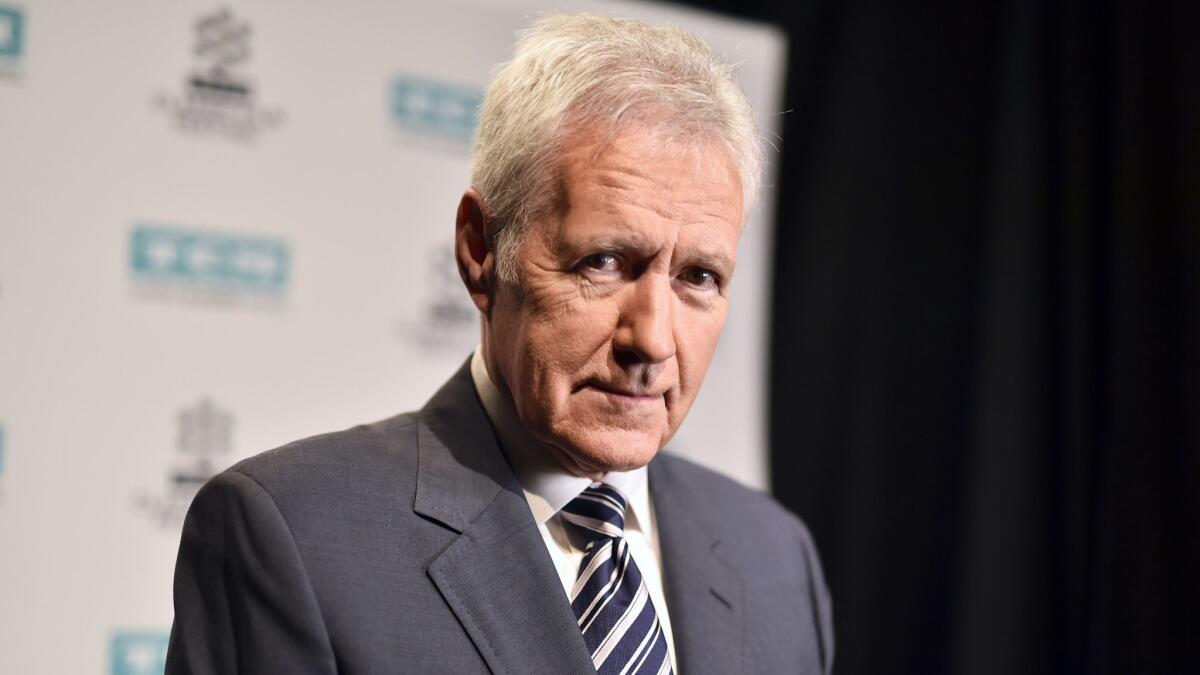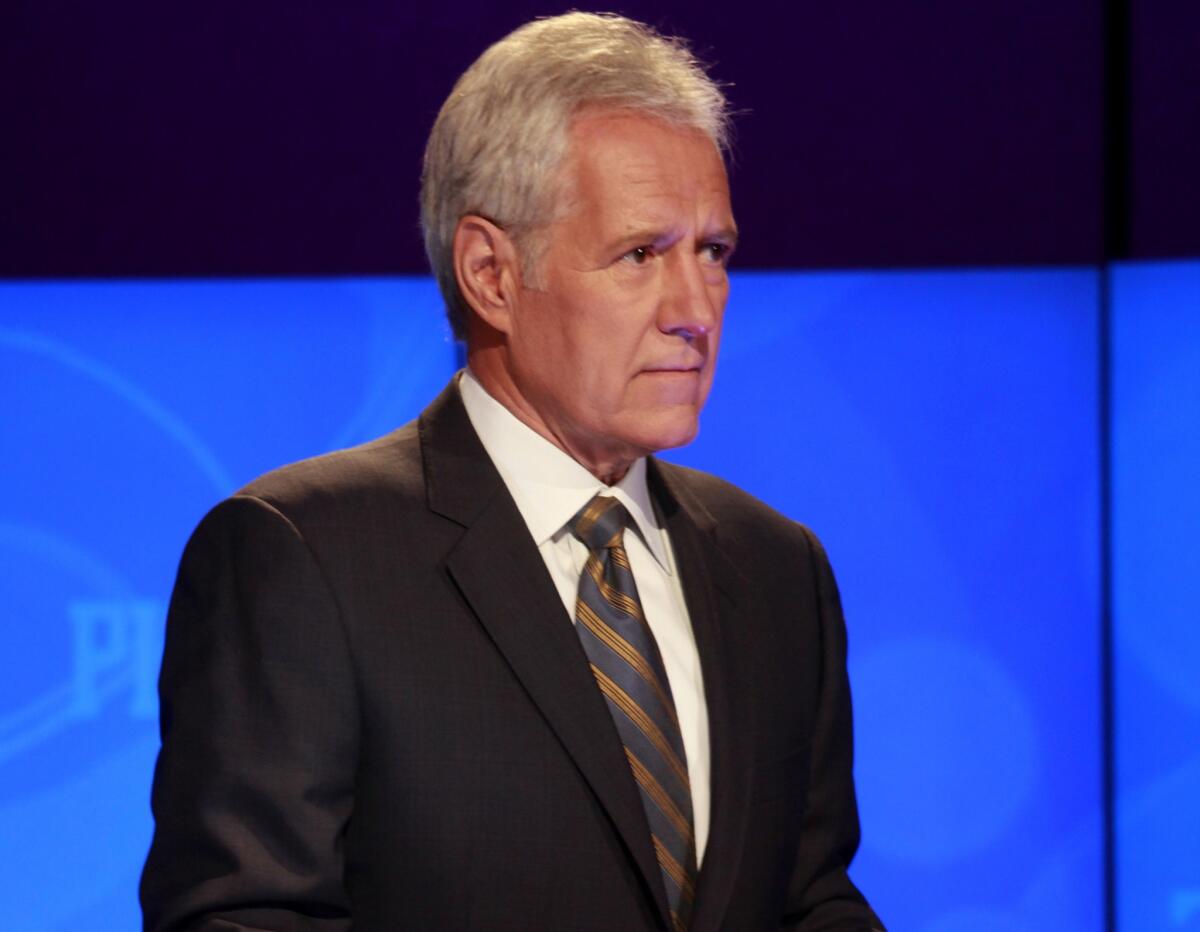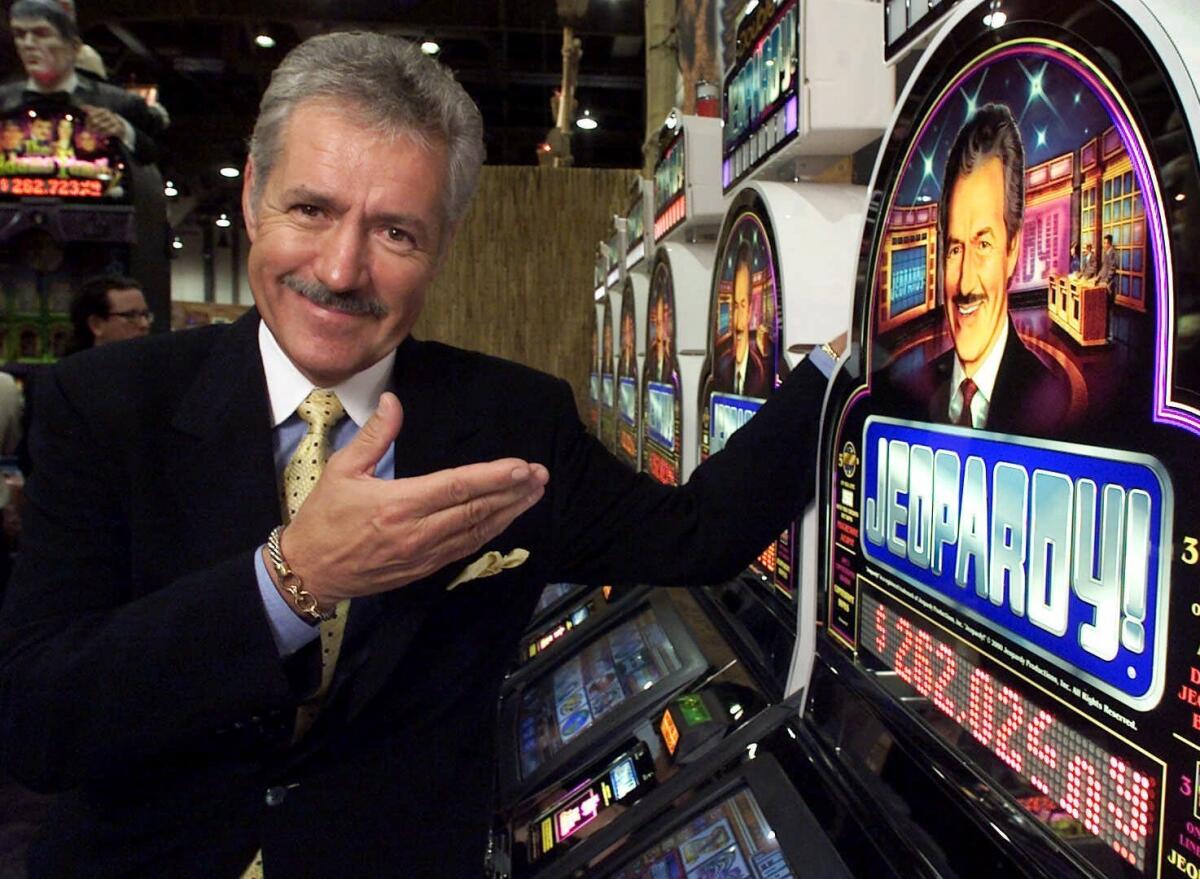Alex Trebek was ‘ready to pack it in’ during cancer battle. He opens up in new memoir

In a public address to “Jeopardy!” viewers last week, Alex Trebek assured fans that he was fine. “Feeling great,” in fact. The treatment for Stage IV pancreatic cancer was “paying off,” he said, and his numbers were good. Wearing one of his well-pressed blazers, his voice steady as ever, he playfully showed off the goatee he’d grown since the pandemic halted production in March.
But in private, Trebek — who turns 80 on Wednesday — has struggled. He admits he had moments of “complete discouragement” when he felt “ready to pack it in,” times when he thought about taking his own his life. And that bothers him. It’s not that he’s ashamed that suicidal thoughts have crossed his mind. He just doesn’t want to be perceived as a disappointment.
“You can’t be telling people ‘Keep your chin up, fight on!’ and then all of a sudden you counter that by: ‘What happened to Trebek?’ ‘Oh, he killed himself. He just got too discouraged,’” the quiz show host says in an interview from his office. “‘Well, hell, he was telling us to be positive. And then he did this negative thing.’ So, yeah. That’s the responsibility that has bothered me.”
Trebek’s new memoir, “The Answer Is ... Reflections on My Life,” is dedicated to “those who are hoping to become survivors.” But as he reveals in the book — which will be published Tuesday — the burden of serving as a beacon of hope has weighed on him. When he began chemotherapy, he started having crying spurts out of the blue. He was troubled by this and confided in his oncologist about the tears. The doctor advised Trebek that they were likely a side effect of his treatment.
“He told me not to feel embarrassed, but I said, ‘I do feel a little embarrassed. I feel like a wuss. It’s not that men shouldn’t cry. It’s that, my God, Alex, get yourself together, here,’” Trebek recalls. Just the day before, he says, he started getting “very emotional for no reason that I can think of” while his son, Matthew, was preparing dinner. Noticing his father’s upset, the 30-year-old stopped cooking and came over to the kitchen table to pat his dad’s back. “And then, the moment was gone. Thank God these things don’t last long. I know that now, so it doesn’t scare me as much as it used to.”

Opening up about any of this in a book was never something Trebek planned. He had long rejected entreaties from publishers hoping he would tell his life story. So when, just weeks after his cancer diagnosis in early 2019, he received an email from Simon & Schuster asking him to write a memoir, he promptly turned down the request.
“He said he just didn’t feel like he had a story worth telling,” says Sean Manning, executive editor at the publishing company. Still, Manning continued to check in every few months to see if Trebek might reconsider. The host was steadfast in his decision until he learned that an unauthorized biography of his life by Lisa Rogak — who had also written about Rachel Maddow, Stephen King and Jon Stewart — was set for publication around his 80th birthday. Trebek hated the notion that the author wouldn’t “get it right” and decided that if he could give his advance money to charity, the effort might be worth it. But to compete with Rogak’s book— which is also coming out on July 21 — Trebek would have to move quickly.
“It was a rush job,” he acknowledges, noting that he began work on the book only in March.
Given the time constraints — and the fact that he doesn’t consider himself a “good enough writer” — Trebek decided he wouldn’t write a soup-to-nuts autobiography. He describes it to readers as “a series of quick look-ins” that touch on the highlights of his life, including his early career, his favorite “Jeopardy!” contestants and his 30-year marriage to second wife, Jean.
It was written with the aid of both Manning and “Jeopardy!” supervising producer Rocky Schmidt, who joined conference calls to jog Trebek’s memory about major life events. After those conversations, Manning would send notes from the chats back to Trebek for revisions — a format “that was going to cause me the least amount of grief, if you will,” the host jokes.
Schmidt, who began working on “Jeopardy!” as Trebek’s assistant in 1987, already knew most of the stories shared on the three-way calls. But by the end of the process, he says he gained fresh perspective on how Trebek lives his life: With a “fundamental feeling of ‘I want the world to be fair.’”
“On the show, there are clear-cut answers, and if you give the right answer, you’re gonna get rewarded for it,” Schmidt says. “He tells a story in the book about how, when he was at military school, he made hospital corners perfectly on his bed and a [senior cadet] tore up the sheets anyway. He was upset that it wasn’t fair.”

Trebek’s impartiality has become a cornerstone of his reputation. He made a conscious decision to keep his political views private so as not to “offend an important segment of our audience.” Born a Canadian, Trebek became a naturalized U.S. citizen in 1998 and writes that he has since voted for both Republicans and Democrats. But because of “the number of crises that are affecting our country right now,” he says he is planning to become more vocal about his beliefs before the 2020 presidential election.
“I’m trying to cope with how I want to do it,” he says. “You have to do it in a way that doesn’t make it seem as if you’re picking on certain people or denigrating their points of view or putting them down because they’re obviously not bright enough to come up with the same conclusions you’ve come up with.”
He is also a rule-follower when it comes to socializing with “Jeopardy!” contestants. Trebek interacts with players only during commercial breaks, not just because of time limitations — he films five shows a day, twice a week — but also because he doesn’t want to create an impression of impropriety. He became closest with Ken Jennings, who won a record-breaking 74 consecutive games, largely because they had so much time to talk on set. Worried his voice wouldn’t be able to hold up, Trebek asked Jennings to record the majority of the audiobook for “The Answer Is … .” The player was honored, especially since their social interactions had been limited.
“The reason why you can’t hang out with Alex is not because he’s snooty — it’s because he’s read all the answers and isn’t allowed to fraternize,” Jennings said. “It’s always funny to see him in non-‘Jeopardy!’ settings where he doesn’t have the Perry Ellis set and he’s wearing dad jeans and a bomber jacket. In real life, he could not be more down-to-earth and less like his fussy Will Ferrell stage persona. ”
Trebek is well aware of what he has come to represent to viewers over his 36 years as the host of “Jeopardy!” He’s the reliable figure you can count on to appear on your television each weeknight, “not so much as a showbiz personality but as an uncle,” he writes. He’s not intimidating. He’s a “second-tier celebrity.” Part of the family.
He leans into this persona in the book, offering up wholesome tidbits about how he’s happiest sitting on the swing in his backyard or eating fried chicken and broccoli for dinner. He doesn’t drink alcohol, save for the “occasional” glass of chardonnay, instead preferring a tall glass of 1% milk in the middle of the night. He arrives everywhere 10 minutes early.
And he loves a routine, always arriving at the Sony Pictures lot in Culver City on tape days at 6 a.m. This gives him time to eat his daily Kit Kat and Diet Pepsi while spending an hour and a half reading through the day’s 305 clues. Then he reads the Los Angeles Times and attempts to complete the crossword puzzle.
“I think after 36 years, people have come to realize who I am and what I represent,” he says. “They know I’m not a flake. They know I’m not a braggart. ...There was a survey that I think Reader’s Digest did about a year or so ago about America’s Most Trusted People, and I made the top 10. I felt really good about that. I dropped right in between Bill and Melinda Gates. I was No. 8.”
So if you’re expecting there to be a smoking gun in “The Answer Is …,” you’ll be disappointed. He does cop to cursing and says that in his younger days he bought a Bentley convertible, Jaguar roadster and then an Italia Spyder to impress people. (These days, he drives a Dodge Ram so that he can lug around the supplies he needs to make house repairs.)
“I’m kind of dull and boring, aren’t I?” he says, assessing himself. “I say it almost apologetically. It would be nice if there was something — not too offensive — but something spectacular that people could say, ‘Oh, yeah! I knew Trebek wasn’t Mr. Goody-Two-Shoes. He had skeletons in his closet.’ But there aren’t.”
Trebek doesn’t dwell on his hardships. After his parents divorced, his mother began dating a new man and got pregnant, ultimately giving the child up for adoption. Trebek did not learn he had a half-brother until he was in his 40s and writes that he “had kind of a resentment for my mother” as a result. Still, they “settled” things long before her death at 95, which Trebek says “didn’t devastate” him because he “had come to terms with it pretty well.”
Of his own divorce, Trebek says in the book that he remains close with his first wife, Elaine, and considers her 53-year-old child, Nicky, his “daughter by osmosis.” And when he decided to marry Jean, 24 years his junior, her father was initially dismayed, but Trebek insists there “were never any in-law problems.”
It was all such plain sailing that even he used to question when the hammer was going to fall.
“And then all of a sudden you say, ‘Well, wait a minute, it did fall.’ A year and a half ago I’m suddenly diagnosed with one of the worst kinds of cancer, and I’ve been dealing with it ever since,” he says solemnly. “So in a sense, ‘Hey, maybe he had too much of a good thing going. Maybe he needed to be brought back down to earth and taught a lesson in that bad things can happen to good people too. So here it is, Alex. Deal with it.’”
Trebek is candid in writing about the toll cancer has taken on his body. In one particularly moving section, he reveals that one day on set his stomach cramps were so excruciating that he collapsed on the floor of his dressing room, crying and writhing in pain. Producers suggested they cancel the taping, but he insisted he continue working — something that has, inexplicably, helped to ease his physical ailments.
“I just cried, because you don’t want anyone you know or love to be in pain,” Schmidt says of walking in on Trebek that day. “Most of the time his pains were very sharp and intense, but they didn’t last a long time, so he knew it would pass. And the minute he walked on stage, nobody out in the audience or the contestants knew he had a problem. I defy you to watch one of those shows and say, ‘This is a day he was in pain.’”
In two weeks, Trebek plans to return to the set, where there will be no audience and contestants will be separated by partitions and more than six feet of distance. He recently started a new immunotherapy program developed by NantKwest, whose chief executive is Dr. Patrick Soon-Shiong, the owner of The Times. But if the program fails to improve his health, he writes in his memoir that he has already told his family he’ll “probably stop treatment.”
“There is an end to all,” he says in a straightforward tone. “Dying is part of life. And, hey, guys, it comes with the territory. So hang in there as long as you can, and let’s see what happens.”
As for the book, he still has mixed feelings. After a pause, he says he is glad he wrote it, but quickly counters that he feels it could have been better if he’d had more time to put it together.
“But what I’m discovering from people who have read the book — and a lot of it unsolicited — is that they like it,” he said. “And so I guess I’ve accomplished what I wanted to. I’ve made people feel good. And I’m going to help a lot of good charities. I just want people to say, ‘He’s a good guy. Now I know why I like him.’”
More to Read
Sign up for our Book Club newsletter
Get the latest news, events and more from the Los Angeles Times Book Club, and help us get L.A. reading and talking.
You may occasionally receive promotional content from the Los Angeles Times.







